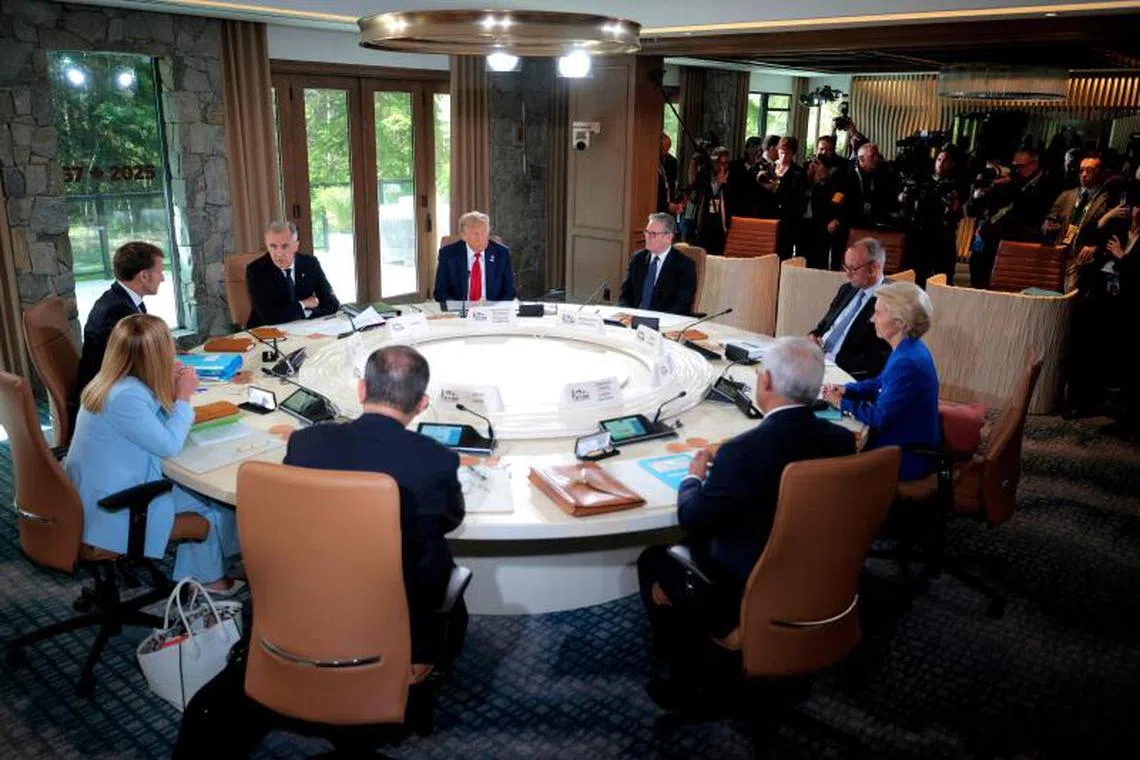G-7 leaders struggle for unity as Trump says removing Russia from group was a mistake
Sign up now: Get ST's newsletters delivered to your inbox

(Clockwise) Italian PM Giorgia Meloni, French President Emmanuel Macron, Canadian PM Mark Carney, US President Donald Trump, British PM Kier Starmer, German Chancellor Friedrich Merz, European Union Commission President Ursula von der Leyen, European Union Council President Antonio Costa and Japanese PM Shigeru Ishiba participate in a meeting at the G-7 Leaders' Summit.
PHOTO: AFP
KANANASKIS, Alberta - Group of Seven leaders faced early challenges during meetings in Canada on June 16 as US President Donald Trump said removing Russia from the former Group of Eight over a decade ago had been a mistake.
The once tight-knit group has struggled to find unity over conflicts in Ukraine and the Middle East as Mr Trump overtly expresses support for Russian President Vladimir Putin and has imposed tariffs on many of the allies present.
G-7 leaders from Britain, Canada, France, Germany, Italy, Japan, and the US, along with the European Union, are convening in the resort area of Kananaskis in the Canadian Rockies until June 17.
Speaking alongside Canadian Prime Minister Mark Carney, Mr Trump said the former Group of Eight had been wrong to kick out Russia in 2014 after it annexed Crimea.
“This was a big mistake,” Mr Trump said, adding he believed Russia would not have invaded Ukraine in 2022 had Putin not been ejected.
“Putin speaks to me. He doesn’t speak to anybody else ... he’s not a happy person about it. I can tell you that he basically doesn’t even speak to the people that threw him out, and I agree with him,” Mr Trump said.
Though Mr Trump stopped short of saying Russia should be reinstated in the group, his comments raise doubts about how much Ukrainian President Volodymyr Zelensky can achieve when he meets the leaders on June 17. European nations say they want to persuade Trump to back tougher sanctions on Moscow
Mr Zelensky said he planned to discuss new weapons purchases
European officials said they hoped to use June 17’s meeting with Mr Zelensky and Nato Secretary-General Mark Rutte and next week’s Nato summit to convince Mr Trump to toughen his stance.
In another early sign the group of democracies may struggle to reach agreement on key issues, a US official said Trump would not sign a draft statement calling for de-escalation of the Israel-Iran conflict.
A Canadian official, though, said the conflict would come up in bilateral meetings throughout the day and it was too early to speculate on the outcome of those conversations. A senior European diplomat echoed those comments, saying Mr Trump had yet to make a decision.
Draft documents
Canada has abandoned any effort to adopt a comprehensive communique to avert a repeat of the 2018 summit in Quebec, when Mr Trump instructed the US delegation to withdraw its approval of the final communique after leaving.
Leaders have prepared several draft documents seen by Reuters, including on migration, artificial intelligence, and critical minerals. None of them have been approved by the United States, however, according to sources briefed on the documents.
Without Mr Trump, it is unclear if there will be any declarations, a European diplomat said.
Talks on June 16 centered around the economy, advancing trade deals, and China. Another European diplomat said leaders agreed in early sessions that China is the real competitor and G-7 allies should not paralyze themselves with trade conflicts. The leaders discussed expanding the G-7 to include other democracies, the diplomat added.
Mr Carney invited non-G-7 members Mexico, India, Australia, South Africa, South Korea and Brazil, as well as Ukraine.
Tariffs
Mr Trump, who travelled to Canada with his top trade negotiators, is expected to discuss trade and tariffs with the leaders of Japan, India and Australia, among others, on the sidelines of the summit.
Mr Trump said he had signed a document finalising a trade deal with Britain, the first country to agree to a deal for lower US tariffs. But implementation has been delayed while details were finalised.
Sources familiar with the planning said they are not expecting the completion of new trade deals during the G-7 summit.
German Chancellor Friedrich Merz said he hoped there would be steps towards a solution to a tariff dispute with the United States, even if a solution itself could not be reached at the summit.
Mr Trump said a new economic deal with host Canada was possible but stressed tariffs had to play a role, a position the Canadian government strongly opposes.
“Our position is that we should have no tariffs on Canadian exports to the United States,” said Ms Kirsten Hillman, Canada’s ambassador to Washington. REUTERS


